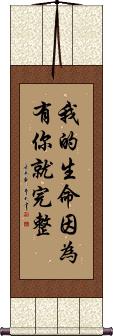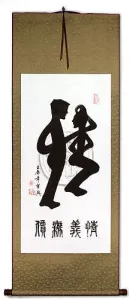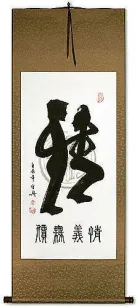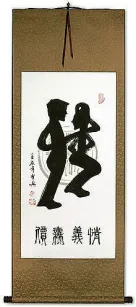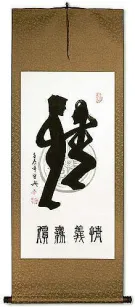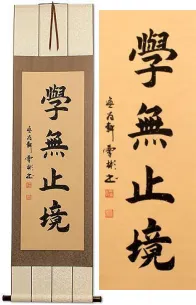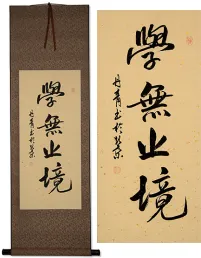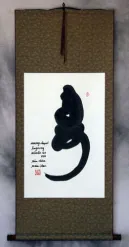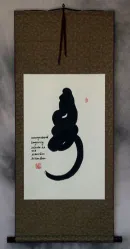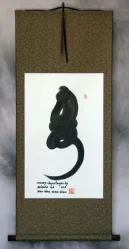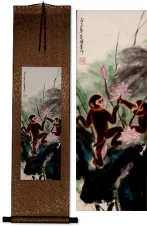Many custom options...
And formats...

Because in Chinese / Japanese...
Buy a Because calligraphy wall scroll here!
My life is complete because of you
This in-stock artwork might be what you are looking for, and ships right away...
Affection / Passion / Love
Special Calligraphy Scroll
Discounted Blemished
Gallery Price: $53.00
Your Price: $29.00
Love / Affection / Passion
Special Calligraphy Scroll
Discounted Blemished
Gallery Price: $53.00
Your Price: $29.00
Affection / Passion / Love
Special Calligraphy Scroll
Discounted Blemished
Gallery Price: $53.00
Your Price: $29.00
Love / Affection / Passion
Special Calligraphy Wall Scroll
Discounted Blemished
Gallery Price: $35.00
Your Price: $19.00
Gallery Price: $180.00
Your Price: $99.88
Gallery Price: $100.00
Your Price: $49.88
Longevity Monkey Chinese Symbol Wall Scroll
Discounted Blemished
Gallery Price: $63.00
Your Price: $35.00
Longevity Monkey Chinese Symbol Wall Scroll
Discounted Blemished
Gallery Price: $63.00
Your Price: $35.00
Longevity Monkey Chinese Symbol Wall Scroll
Discounted Blemished
Gallery Price: $63.00
Your Price: $35.00
Not the results for because that you were looking for?
Below are some entries from our dictionary that may match your because search...
| Characters If shown, 2nd row is Simp. Chinese |
Pronunciation Romanization |
Simple Dictionary Definition |
〇 see styles |
líng ling2 ling maru まる |
More info & calligraphy: Enso - Japanese Zen Circle(1) circle (sometimes used for zero); (2) 'correct' (when marking); (3) symbol used as a placeholder (either because a number of other words could be used in that position, or because of censorship); (4) period; full stop; (5) maru mark; semivoiced sound; p-sound |
明 see styles |
míng ming2 ming mei / me めい |
More info & calligraphy: Light / Bright(1) (ant: 暗) brightness; (2) discernment; insight; an eye (for); (3) (See 明を失う) eyesight; vision; (prefix) (4) (abbreviation) (See 明治) nth year in the Meiji era (1868.9.8-1912.7.30); (surname) Meishuu vidyā, knowledge. ming means bright, clear, enlightenment, intp. by 智慧 or 聰明 wisdom, wise; to understand. It represents Buddha-wisdom and its revelation; also the manifestation of a Buddha's light or effulgence; it is a term for 眞言 because the 'true word' can destroy the obscurity of illusion; the 'manifestation' of the power of the object of worship; it means also dhāraṇīs or mantras of mystic wisdom. Also, the Ming dynasty A. D. 1368-1644. |
牛 see styles |
niú niu2 niu ushi(p); gyuu; ushi / ushi(p); gyu; ushi うし(P); ぎゅう; ウシ |
More info & calligraphy: Ox / Bull / Cow(1) cattle (Bos taurus); cow; bull; ox; calf; (2) {food} (usu. ぎゅう) (See 牛肉) beef; (3) (ぎゅう only) {astron} (See 二十八宿,玄武・げんぶ・2) Chinese "Ox" constellation (one of the 28 mansions); (surname) Niu go, gaus; ox, bull, bullock, etc. A term applied to the Buddha Gautama as in 牛王 king of bulls, possibly because of the derivation of his name; the phrase 騎牛來牛 (or 騎牛覔牛) to ride an ox, to seek an ox, means to use the Buddha to find the Buddha. |
觀世音 观世音 see styles |
guān shì yīn guan1 shi4 yin1 kuan shih yin Kanzeon かんぜおん |
More info & calligraphy: Guan Shi Yin: Protector Of Life(out-dated kanji) Avalokiteshvara (Bodhisattva); Avalokitesvara; Kannon; Kwannon; Guanyin; Buddhist deity of compassion Regarder of the world's sounds, or cries, the so-called Goddess of Mercy; also known as 觀音; 觀世音善薩; 觀自在 (觀世自在); 觀尹; 光世音 (the last being the older form). Avalokiteśvara, v. 阿 8. Originally represented as a male, the images are now generally those of a female figure. The meaning of the term is in doubt; it is intp. as above, but the term 觀自在 (觀世自在) accords with the idea of Sovereign Regarder and is not associated with sounds or cries. Guanyin is one of the triad of Amida, is represented on his left, and is also represented as crowned with Amida; but there are as many as thirty-three different forms of Guanyin, sometimes with a bird, a vase, a willow wand, a pearl, a 'thousand' eyes and hands, etc., and, when as bestower of children, carrying a child. The island of Putuo (Potala) is the chief centre of Guanyin worship, where she is the protector of all in distress, especially of those who go to sea. There are many sūtras, etc., devoted to the cult, but its provenance and the date of its introduction to China are still in doubt. Chapter 25 of the Lotus Sūtra is devoted to Guanyin, and is the principal scripture of the cult; its date is uncertain. Guanyin is sometimes confounded with Amitābha and Maitreya. She is said to be the daughter of king Śubhavyūha 妙莊王, who had her killed by 'stifling because the sword of the executioner broke without hurting her. Her spirit went to hell; but hell changed into paradise. Yama sent her back to life to save his hell, when she was miraculously transported on a Lotus flower to the island of Poo-too'. Eitel. |
乎 see styles |
hū hu1 hu sachio さちお |
(classical particle similar to 於|于[yu2]) in; at; from; because; than; (classical final particle similar to 嗎|吗[ma5], 吧[ba5], 呢[ne5], expressing question, doubt or astonishment) (personal name) Sachio what? how? |
以 see styles |
yǐ yi3 i yue ゆえ |
to use; by means of; according to; in order to; because of; at (a certain date or place) (female given name) Yue By means of, by using, by; whereby, in order to. |
侭 see styles |
mama まま |
(n,n-adv) (1) (kana only) as it is; as one likes; because; as; (2) (kana only) condition; state; (surname) Mama |
儘 尽 see styles |
jǐn jin3 chin mama まま |
to the greatest extent; (when used before a noun of location) furthest or extreme; to be within the limits of; to give priority to (n,n-adv) (1) (kana only) as it is; as one likes; because; as; (2) (kana only) condition; state; (surname) Mama |
因 see styles |
yīn yin1 yin in いん |
cause; reason; because (1) cause; factor; (2) {Buddh} (See 縁・えん・5) hetu (direct cause, esp. as opposed to indirect conditions); (3) (See 因明) the basis of one's argument (in hetuvidya); (personal name) Yukari hetu: a cause: because: a reason: to follow, it follows, that which produces a 果 result or effect. 因 is a primary cause in comparison with 緣 pratyaya which is an environmental or secondary cause. In the 十因十果 ten causes and ten effects, adultery results in the iron bed, the copper pillar, and the eight hot hells; covetousness in the cold hells; and so on, as shown in the 楞嚴經. Translit. in, yin. Cf. 印. |
条 see styles |
jou / jo じょう |
(n,ctr) (1) article (in a document); clause; section; provision; (counter) (2) counter for lines, stripes, streaks, rays, etc.; (conjunction) (3) (as とは言い条) although; though; (conjunction) (4) (used in letters) since; as; because; inasmuch as; (5) (hist) (See 条坊制) jō; north-south division of an imperial city consisting of west-east streets and their corresponding wards (in the jō-bō system); (given name) Nagashi |
為 为 see styles |
wèi wei4 wei su す |
because of; for; to (vs-c) (kana only) (literary form of する) (See する・1) to do; (female given name) Nari |
爲 为 see styles |
wèi wei4 wei tame ため |
variant of 為|为[wei4] (out-dated kanji) (1) (kana only) good; advantage; benefit; welfare; (2) (kana only) sake; purpose; objective; aim; (3) (kana only) consequence; result; effect; (4) (kana only) affecting; regarding; concerning; (surname) Tame To do; to make; to effect; to be; because of; for. |
由 see styles |
yóu you2 yu yoshitsugu よしつぐ |
to follow; from; because of; due to; by; via; through; (before a noun and a verb) it is for ... to ... (1) reason; significance; cause; (2) piece of information that one has heard; I hear that ...; it is said that ...; (personal name) Yoshitsugu From; by: a cause, motive; to allow, let; translit. yo, yu; e. g. 由乾; 由乾陀羅 由乾陁羅, Yugaṃdhara, idem 踰健達羅. |
米 see styles |
mǐ mi3 mi yone よね |
uncooked rice; meter (unit of length); (slang) Chinese yuan (1) (because 米 can be deconstructed into 八十八) 88 years old; (2) (archaism) (See 米・こめ・1) rice; (surname) Yonehama śāli, rice, i. e. hulled rice. The word śālihas been wrongly used for śarīra, relics, and for both words 舍利 has been used. |
芸 see styles |
yún yun2 yün nori のり |
common rue (Ruta graveolens); (used in old compounds relating to books because in former times rue was used to protect books from insect damage) art; craft; accomplishment; artistic skill; technique; performance; (personal name) Nori |
騺 see styles |
zhì zhi4 chih |
heavy horse; horse unable to move because of twisted leg; plodding |
〇〇 see styles |
marumaru まるまる |
(1) symbol used as a placeholder (either because a number of other words could be used in that position, or because of censorship); (prefix noun) (2) certain; unnamed; undisclosed; unidentified |
から see styles |
kara から |
(particle) (1) from (e.g. time, place, numerical quantity); since; (particle) (2) from (originator); by; (particle) (3) (follows verbs, adjectives) because; since; (particle) (4) out of (constituent, part); (particle) (5) through (e.g. window, vestibule); (particle) (6) (following the te-form of a verb) after; since; (particle) (7) (See いいから・1) expresses sympathy or warning; (place-name) Qara (Arab Union) |
こそ see styles |
koso こそ |
(particle) (1) (emphasizes preceding word or phrase) it is ... that ...; precisely; in particular; definitely; for sure; only (when, after, because, etc.); (particle) (2) (as こそあれ, こそすれ, こそするが, etc.) although; while; it is the case that ... but; (particle) (3) (after conditional -ba form of verb) it is precisely because ... that ...; only because ...; (particle) (4) (form) (after -nai stem of verb + ば) not at all; not in the slightest; absolutely not; never |
とて see styles |
tote とて |
(particle) (1) (form) even; (particle) (2) (form) even if ...; even though ...; (particle) (3) (form) (oft. as こととて) because ...; as ...; on the grounds that ...; (particle) (4) (form) with the purpose of ...; in order to ...; with a view to ... |
ので see styles |
node ので |
(particle) that being the case; because of ...; the reason is ....; given that... |
丈に see styles |
dakeni だけに |
(exp,conj) (1) (kana only) given that ... it is only natural that ...; ... being the case, it is unavoidable that ...; (precisely) because ...; as might be expected (from ...); (exp,conj) (2) (kana only) (when used with negatives) contrary to expectations ... |
三乘 see styles |
sān shèng san1 sheng4 san sheng minori みのり |
(surname) Minori Triyāna, the three vehicles, or conveyances which carry living beings across saṁsāra or mortality (births-and-deaths) to the shores of nirvāṇa. The three are styled 小,中, and 大. Sometimes the three vehicles are defined as 聲聞 Śrāvaka, that of the hearer or obedient disciple; 緣覺Pratyeka-buddha, that of the enlightened for self; these are described as 小乘 because the objective of both is personal salvation; the third is 菩薩Bodhisattva, or 大乘 Mahāyāna, because the objective is the salvation of all the living. The three are also depicted as 三車 three wains, drawn by a goat, a deer, an ox. The Lotus declares that the three are really the One Buddha-vehicle, which has been revealed in three expedient forms suited to his disciples' capacity, the Lotus Sūtra being the unifying, complete, and final exposition. The Three Vehicles are differently explained by different exponents, e.g. (1) Mahāyāna recognizes (a) Śrāvaka, called Hīnayāna, leading in longer or shorter periods to arhatship; (b) Pratyeka-buddha, called Madhyamayāna, leading after still longer or shorter periods to a Buddhahood ascetically attained and for self; (c) Bodhisattva, called Mahayana, leading after countless ages of self-sacrifce in saving others and progressive enlightenment to ultimate Buddhahood. (2) Hīnayāna is also described as possessing three vehicles 聲, 緣, 菩 or 小, 中, 大, the 小 and 中 conveying to personal salvation their devotees in ascetic dust and ashes and mental annihilation, the 大 leading to bodhi, or perfect enlightenment, and the Buddha's way. Further definitions of the Triyāna are: (3) True bodhisattva teaching for the 大; pratyeka-buddha without ignorant asceticism for the 中; and śrāvaka with ignorant asceticism for the 小. (4) (a) 一乘 The One-Vehicle which carries all to Buddhahood: of this the 華嚴 Hua-yen and 法華 Fa-hua are typical exponents; (b) 三乘法 the three-vehicle, containing practitioners of all three systems, as expounded in books of the 深密般若; (c) 小乘 the Hīnayāna pure and simple as seen in the 四阿合經 Four Āgamas. Śrāvakas are also described as hearers of the Four Truths and limited to that degree of development; they hear from the pratyeka-buddhas, who are enlightened in the Twelve Nidānas 因緣; the bodhisattvas make the 六度 or six forms of transmigration their field of sacrificial saving work, and of enlightenment. The Lotus Sūtra really treats the 三乘. Three Vehicles as 方便 or expedient ways, and offers a 佛乘 Buddha Vehicle as the inclusive and final vehicle. |
下品 see styles |
xià pǐn xia4 pin3 hsia p`in hsia pin gehin げひん |
(noun or adjectival noun) vulgar; indecent; coarse; crude; (place-name) Shimoshina The three lowest of the nine classes born in the Amitābha Pure Land, v. 無量壽經. These three lowest grades are (1) 下品上生 The highest of the three lowest classes who enter the Pure Land of Amitābha, i.e. those who have committed all sins except dishonouring the sūtras. If at the end of life the sinner clasps hands and says "Namo Amitābha", such a one will be born in His precious lake. (2) 下品中生 The middle class consists of those who have broken all the commandments, even stolen from monks and abused the law. If at death such a one hears of the great power of Amitābha, and assents with but a thought, he will be received into paradise. (3) 下品下生 The lowest class, because of their sins, should have fallen into the lowest gati, but by invoking the name of Amitābha, they can escape countless ages of reincarnation and suffering and on dying will behold a lotus flower like the sun, and, by the response of a single thought, will enter the Pure Land of Amitābha. |
二字 see styles |
èr zì er4 zi4 erh tzu niji にじ |
two characters; name; (surname) Niji Double-letters, i.e. a monk-because a monk's name consists of two characters. |
五山 see styles |
wǔ shān wu3 shan1 wu shan gosan; gozan ごさん; ござん |
(rare) five most important temples of a region; (surname) Goyama Five mountains and monasteries: (1) in India, sacred because of their connection with the Buddha: 鞞婆羅跋怒 Vaibhāra-vana; 薩多般那求呵 Saptaparṇaguhā; 因陀羅勢羅求呵 Indraśailaguhā; 薩簸恕魂直迦鉢婆羅 Sarpiṣ kuṇḍikā-prāgbhāra; 耆闍崛 Gṛdhrakūṭa; (2) in China, established during the Five Dynasties and the Southern Sung dynasty, on the analogy of those in India; three at Hangzhou at 徑山 Jingshan, 北山 Beishan, and 南山 Nanshan and two at Ningbo at 阿育王山 King Aśoka Shan and 太白山 Taiboshan. Later the Yuan dynasty established one at 全陵 Chin Ling, the 天界大龍翔隻慶寺 which became chief of these under the Ming dynasty. |
人因 see styles |
rén yīn ren2 yin1 jen yin ninin |
The causative influences for being reborn as a human being, i.e. a good life. Those in positions of honour have obtained them by former deeds of benevolence, reverence to Buddhas and monks, patience, humility, devotion to the sutras, charity, morality, zeal and exhortation, obedience, loyalty - hence they have obtained affluence, long life, and are held in high regard. Those in mean condition are thus born because of the opposite characteristics in previous incarnation. |
以て see styles |
motte もって |
(conj,exp) (1) (kana only) with; by; (2) (kana only) by means of; because; in view of |
以此 see styles |
yǐ cǐ yi3 ci3 i tz`u i tzu ishi |
with this; thereby; thus; because of this by this... |
佛子 see styles |
fó zǐ fo2 zi3 fo tzu busshi ぶっし |
(surname) Busshi Son of Buddha; a bodhisattva; a believer in Buddhism, for every believer is becoming Buddha; a term also applied to all beings, because all are of Buddha-nature. There is a division of three kinds: 外子 external sons, who have not yet believed; 度子 secondary sons, Hīnayānists; 眞子 true sons, Mahāyānists. |
Click here for more because results from our dictionary
The following table may be helpful for those studying Chinese or Japanese...
| Title | Characters | Romaji (Romanized Japanese) | Various forms of Romanized Chinese | |
| My life is complete because of you | 我的生命因為有你就完整 我的生命因为有你就完整 | wǒ de shēng mìng yīn wèi yǒu nǐ jiù wán zhěng wo3 de sheng1 ming4 yin1 wei4 you3 ni3 jiu4 wan2 zheng3 wo de sheng ming yin wei you ni jiu wan zheng | wo te sheng ming yin wei yu ni chiu wan cheng | |
| In some entries above you will see that characters have different versions above and below a line. In these cases, the characters above the line are Traditional Chinese, while the ones below are Simplified Chinese. | ||||
Successful Chinese Character and Japanese Kanji calligraphy searches within the last few hours...
